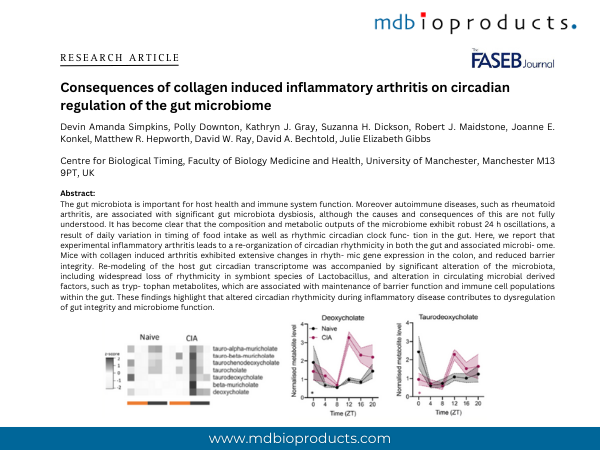
Featured Publication in Focus: Consequences of collagen induced inflammatory arthritis on circadian regulation of the gut microbiome
Mar 19 , 2024
Authors:
Devin Amanda Simpkins, Polly Downton, Kathryn J. Gray, Suzanna H. Dickson, Robert J. Maidstone, Joanne E. Konkel, Matthew R. Hepworth, David W. Ray, David A. Bechtold, Julie Elizabeth Gibbs
Centre for Biological Timing, Faculty of Biology Medicine and Health, University of Manchester, Manchester M13 9PT, UK
Federation of American Societies for Experimental Biology. Wiley. 15 December 2022
----------------------
Products referenced:
Catalogue # 804001-lyo
Collagen Type II, Bovine, Immunization Grade, Lyophilized, 10 mg
Catalogue # 501009
Complete Freund's Adjuvant, 4 mg/mL (5 mL)
----------------------
ABSTRACT
The gut microbiota is important for host health and immune system function. Moreover autoimmune diseases, such as rheumatoid arthritis, are associated with significant gut microbiota dysbiosis, although the causes and consequences of this are not fully understood. It has become clear that the composition and metabolic outputs of the microbiome exhibit robust 24 h oscillations, a result of daily variation in timing of food intake as well as rhythmic circadian clock function in the gut. Here, we report that experimental inflammatory arthritis leads to a re-organization of circadian rhythmicity in both the gut and associated microbiome. Mice with collagen induced arthritis exhibited extensive changes in rhythmic gene expression in the colon, and reduced barrier integrity. Re-modeling of the host gut circadian transcriptome was accompanied by significant alteration of the microbiota, including widespread loss of rhythmicity in symbiont species of Lactobacillus, and alteration in circulating microbial derived factors, such as tryptophan metabolites, which are associated with maintenance of barrier function and immune cell populations within the gut. These findings highlight that altered circadian rhythmicity during inflammatory disease contributes to dysregulation of gut integrity and microbiome function.
To continue reading and to download the publication:
